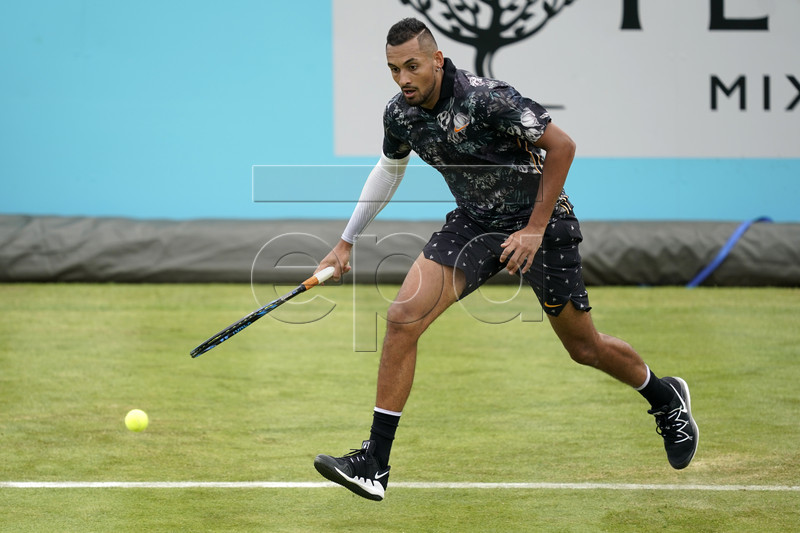- 10sBalls Shares The 2019 U.S. Open Ladies Draw
- Tennis Racket News • 2019 Wilson Blade Series Launched
- Ladies Qualifying Draw, Results, & Order Of Play From The 2019 US Open Tennis
- Men’s Qualifying Draw, Results, & Order Of Play From The 2019 US Open Tennis
- Tennis News • U.S. Open Seed Report: Djokovic Leads The Way
- Postcard From Dusan Vemic From New York City And The U.S. Open
- Old Tennis Players Never Die • They Just Lose Their Balls
- Ladies Qualifying Draw, Results, & Order Of Play From The 2019 US Open Tennis
- Men’s Qualifying Draw, Results, & Order Of Play From The 2019 US Open Tennis
- Updated Draws & Order Of Play From The WTA Bronx Open Tennis
What’s With Tennis Sensation Nick Kyrgios? 10sBalls News From Queen’s Club In London
- Updated: June 22, 2019

Australia’s Nick Kyrgios reacts during his Round of 32 match against Spain’s Roberto Carballes Baena at the Fever Tree Championship at Queen’s Club in London, Britain, 20 June 2019. EPA-EFE/WILL OLIVER
By Alix Ramsay
And in a shock development, Nick Kyrgios is in trouble again. Another run in with an umpire and another derogatory comment about an official all topped off with slinging his racket into the crowd after another loss.
The cherry on the cake was his invitation to certain members of the crowd to go and engage in an act which some described as “lewd” and others did not think physically possible without the aid of block and tackle and plenty of wintergreen ointment.
The end result of this bad day at the office was a $17,500 fine (pretty much half of his winnings at the Fever-Tree Championships) and yet more headlines castigating him for his behaviour.
According to the stuffed shirts who sit in the posh seats just waiting for him to blow a gasket, Kyrgios is a disgrace, an outrage, a carbuncle on the pristine and beautiful face of the sport. Short of demanding that Kyrgios be horsewhipped, these defenders of the good name of tennis could not be more vehement in their condemnation of one of the brightest talents on the tour.
And according to the less-than-sober watchers from the cheap seats, Kyrgios is fair game. So great has his reputation become that some take great delight in goading him in the hope of getting a response. Who knows, if they call him a rude name, Kyrgios could go nuts and get a warning from the ump while they could get their picture in the paper for starting it all. Win-win. Or it is unless you are Nick Kyrgios.
It was five years ago that Kyrgios announced his arrival on the world stage by beating Rafa Nadal in the fourth round at Wimbledon. In four, fearless, blistering sets, he dismissed the French Open champion and then world No.1 with a display of power, aggression and sheer chutzpah. Surely no one could create an angle/invent a shot/pull off a second serve ace like that….but Kyrgios could. And he did. And he won. And when he woke up the next morning, he was Australia’s new favourite son.
Seemingly, he could do no wrong. But then he did wrong – a rude word to an umpire here, a lacklustre performance there – and the whole world came crashing down around him. He was 19 at the time.
It is hardly surprising, then, that Andy Murray took an interest in the progress of the young firebrand. Murray, too, had found the business of growing up in the spotlight hard to handle. Like Kyrgios, he came from a country desperate to recreate the success of yesteryear and one that leapt on any young talent with a hint of potential. Murray also came from a country with a very active media, one that was happy to build its players up and happier still to cut them back down again. Murray was supportive of Kyrgios in his early days and remains a firm friend now.
That, though, is the acid test: in the locker room, no one of any importance has a bad word to say about Nick. Murray will practice with him and says that he is respectful, hardworking when they are on court and good fun when they are away from the court. Sure enough, he will pull Kyrgios up on some on his more outrageous offences – the spat with Wawrinka and the comments made about the Swiss’s then girlfriend were a case in point – but he is willing to cut his friend some slack. Murray knows how tough it is to have your every twitch and tic analysed, criticised and deconstructed and then splashed all over the papers, TV and radio.
What the players know and what the public do not see is that Nick is not a bad lad. Yes, he has a short fuse and, yes, his mouth sometimes runneth over. But he has had the same girlfriend for years, he is never photographed falling out of nightclubs or casinos with a blonde on each arm, his idea of a good time is playing basketball or video games with his mates – this is not the debauched lifestyle of a bad boy multimillionaire.

Then there is his charity work. He set up the NK Foundation with the aim of helping disadvantaged kids in Australia. Or as he wrote on the playersvoice.com.au website two years ago:
“A couple of years ago I had a vision: to build a facility for disadvantaged and underprivileged kids where they could hang out, be safe and feel like they were part of a family. There’d be tennis courts and basketball courts and a gym and an oval to kick the footy. There’d be things to eat and beds to sleep in.
“For the first time, I feel like there is a reason for me to be doing what I’m doing. Tennis is a great life – we’re well paid and the perks are pretty good – but it can feel empty if you’re just doing it for the money.”
This, of course, hardy makes him the new Mother Theresa but when is around the young kids, when he invites terminally ill kids to come and watch him play and practice, when he hits with them and larks about with them, he is a different man.
Those moments are moments of escape for Kyrgios. He has often spoken about his struggles with life on tour: the home sickness, the loneliness, the pressure to perform in every match, be it on centre court or out in boon docks, and last year he admitted that he had started seeing a couple of psychologists to help him keep on top of his mental health.
“There were times where I wasn’t in the best mental health state,” he told the Sydney Morning Herald last year, “so I’ve got to go out there and just be happy and enjoy myself and tennis. I think when everything lines up in my life, tennis will take care of itself.
“I probably left it a little too long. But I’ve been doing that and I feel more open about talking about it, I don’t feel like I’ve got to hide that sort of stuff any more.”
The ATP, too, has a network of people on hand if Kyrgios, or any other player, needs someone to turn to. The physios have contacts in every field of the health business, including mental health, but while they can suggest that a young man in clear need of support talks to a professional, they cannot make them do it. And the hardest part of mental health issues is finding the strength to reach out to someone for help.
Kyrgios is clearly a complicated character and, at times, a haunted soul. But that does not make him a bad man. He is also one of the most gifted players on the planet, one who not only has the ability to do anything with bat and ball but who has nerve to do it in the most pressurised of situations. When he is hot, every man in the locker room has cause to be nervous and not one of them doubts that Kyrgios could win a grand slam title.
Yet that in itself is the greatest pressure. What if Nick doesn’t win a slam (and the nearest he has come is the Wimbledon quarter-finals in 2014 and the Australian Open quarter-finals the following year)? What if his very best is not good enough to beat someone else’s very best?
If he tanks a set and goes on to lose the match, the other guy hasn’t beaten Nick; Nick has beaten Nick. That can help dodge the pressure in a weird way.
Yet anyone who has seen him in bits after one his meltdowns can see how much it all means to him, no matter how hard he tries to hide it. And then he mops himself up, puts his ‘hard man’ face on and goes to do battle with the media in the press conference. We in the press are baying for blood, he is determined not to give it to us. That does that make him a bad man, either.
Nick Kyrgios is a remarkable talent; the puffed up buffoons and the half-cut idiots, the social media trolls and the peripatetic columnists who descend on tennis only for the grand slams, are irrelevant. He is not the only player to question an umpire’s eyesight, sanity or parentage but he is usually the only one to get hauled over the coals for it.
Who knows the answer to the Kyrgios problem but maybe, just maybe, if those watching – be they officials, media or paying punters – judged the man rather than his reputation it might help. And if Kyrgios could learn to give himself some space – give himself some time to decompress, to get away from the pressure and to recharge the mental batteries – then he might be able to cope with the stresses of the tour better.
If he does that, he might just start winning the titles that his talent deserves.






